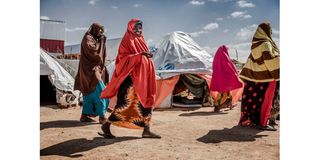Include more women on climate mitigation

Women at a displacement camp for people affected by floods in Beledweyne, Somalia, in 2019. Due to climate change floods and droughts have become more recurrent. A UN official says climate change remains the world's largest global threat, especially to women.
What you need to know:
- President of the 76th session of the United Nations General Assembly Abdulla Shahid, has called for an increased inclusion of women on climate mitigation.
- Women and girls are highly vulnerable to gender-based violence due to climate crisis, according to United Nations Environment Program.
President of the 76th session of the United Nations General Assembly Abdulla Shahid, has called for an increased inclusion of women on climate mitigation.
Mr Shahid who spoke during the high-level thematic debate on delivering climate action for people, planet and prosperity in New York, said climate change still remains the world's largest global threat and women should be empowered to participate in tackling the crisis.
"We...owe it to the world’s women and girls, who are both disproportionately impacted by climate change," he said
He said as climate change remains highest priority for countries to address, they must as well do more in bringing women to the decision making table on related matters.
Environmental delegations
"Women comprise less than 30 per cent of climate and biodiversity researchers," he said.
"(They) make up only 38 per cent of national environmental delegations. At the ministerial level, only 12 per cent of heads of environment are women. We must do better."
Women and girls are highly vulnerable to gender-based violence due to climate crisis, according to United Nations Environment Program.
Daughters are married off by families in exchange for money and property to stave off hunger owing to loss of natural resources on which they depend on for a livelihood.
They are also exposed to attacks due to the long distances they are forced to walk to collect firewood and fetch water.
“To prevent gender-based violence, make sure women, men, girls and boys have equitable access to natural resources, credit, education and information and markets,” the UN agency recommends in its 2019 Gender and Environment Outlook document.
Global warming
Policy researcher, Bhumika Muchhala, recently called for integration of care work and care economy investments in measures to tackle global warming.
She said during a Defending and advancing indigenous feminist ecological alternatives webinar by Natural Justice that "public investment in care (economy) will be necessary to mitigate inequities flowing from climate disasters."
Global leaders are currently meeting at Glasgow, Scotland for the 26th UN Climate Change Conference of the Parties to deliberate on ways of accelerating realisation of Paris Agreement, which binds countries to a commitment of limiting global warming to1.5 degrees Celsius.





